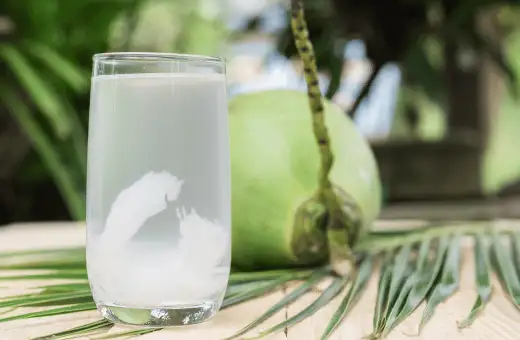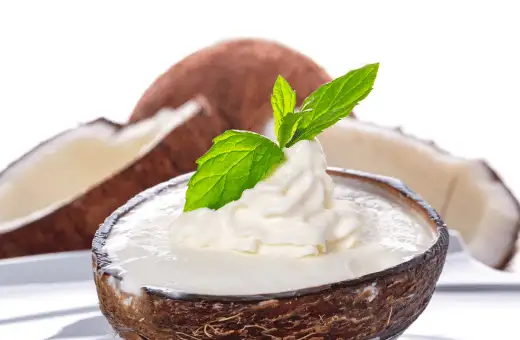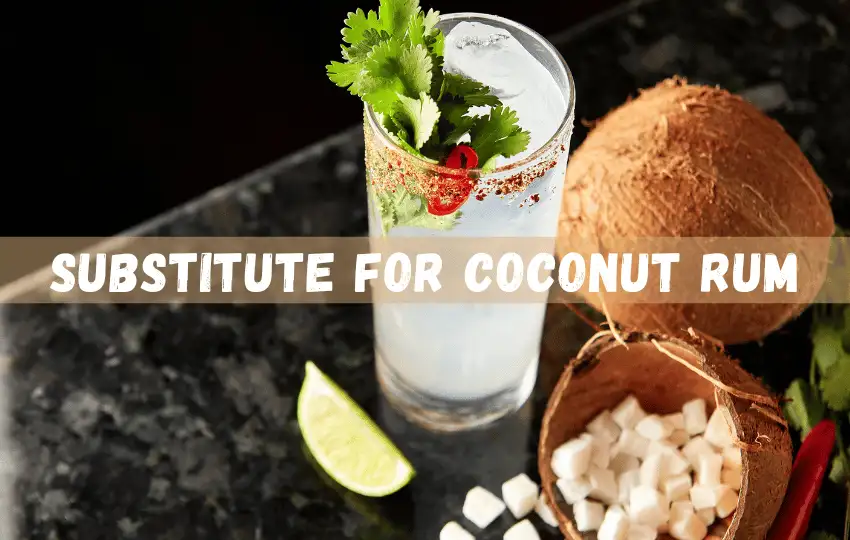Coconut Rum is a popular ingredient in cocktails and other recipes that require an exotic, tropical flavor.
But what if you can’t find coconut rum or don’t like to use it because of dietary restrictions or personal preferences?
No need to stress because in this blog post, we will introduce you to the 17 best substitutes for coconut rum that you can use in your favorite recipes.
We will also provide the right ratio for each substitute and how to use them.
In short, " What can I use instead of coconut rum?" Coconut Extract, Coconut Water, Pineapple Juice, Pineapple Juice and Coconut Milk, Coconut Cream, Coconut Milk and Vodka, Malibu Black, Rum and Coconut Extract, Coconut Flavored Syrup, Cream of Coconut, Sake, Vodka and many more.
What is coconut rum, and what does coconut rum taste like?
Coconut rum is a type of flavored rum that infuses the tropical flavor of coconut into the spirit. It is typically made by blending or infusing rum with natural or artificial coconut flavorings.
Coconut rum often has a smooth and sweet taste profile with prominent notes of coconut, complemented by the underlying warmth and richness of the rum base.
The flavor can vary between different brands and variations, but it generally offers a tropical and exotic essence that is reminiscent of coconut.
It is a popular choice for creating tropical cocktails and adding a touch of sweetness and island flavor to mixed drinks.
Uses of coconut rum
Coconut rum can be enjoyed neat, on the rocks, or mixed into various cocktails such as piña coladas and daiquiris.
In addition to its flavor, coconut rum has several other uses as well. It can use as an ingredient in marinades and sauces to give them an additional kick of sweetness and coconut flavor.
Coconut rum also pairs well with fruit juices and syrups for making easy drinks like sangria. Additionally, it can be added to desserts like cakes or custards for a subtle hint of sweetness.
Coconut rum is low in calories compared to other alcohols, making it a great choice for those looking for lighter options without sacrificing flavor.
Its natural sweetness means that less sugar has to be added if one is looking to make cocktails with fewer calories.
Plus, when used in cooking, the alcohol will burn off, leaving behind the delicious taste of coconut but not any of the buzz associated with drinking it straight up.
Where to buy coconut rum?
If you are looking for coconut rum where to buy, there are a few other places you can go. Many specialty food stores carry it, as do some international grocery stores.
You can also order online from many retailers that provide a variety of diverse flavors and types of coconut rum.
Best Substitutes for Coconut Rum
1. Coconut Extract – A good Substitute for Coconut Rum
Coconut extract is an excellent substitute for coconut rum because it has the same coconut flavor without the alcohol.
Ratio or measurement: To use it, replace 1 oz. of coconut rum with 1 tsp of coconut extract.
You can count a small quantity of vodka to mimic the alcohol content of coconut rum. Use it in cocktails and desserts like coconut cream pie and coconut macaroons.
2. Coconut Water – similar to Coconut Rum

Coconut water is a refreshing, low-calorie alternative to coconut rum that can be used in cocktails or mocktails.
Ratio or measurement: Use 3 oz. of coconut water for every 1 oz. of coconut rum to mimic the flavor.
3. Try Pineapple Juice to replace Coconut Rum
Pineapple juice has a strong tropical flavor that makes it a great substitute for coconut rum in cocktails.
Ratio or measurement: To use it, replace 1 oz. of coconut rum with 2 oz. of pineapple juice.
You can add a splash of coconut extract to enhance the coconut flavor.
4. Pineapple Juice and Coconut Milk – similar to Coconut Rum
If you like a creamy consistency, you can mix pineapple juice and coconut milk to replace coconut rum.
Ratio or measurement: Use 1 oz. of coconut milk and 1 oz. of pineapple juice for every 1 oz. of coconut rum.
You can add a little coconut extract to enhance the flavor.
5. Coconut Cream – a tasty alternative to Coconut Rum

Coconut cream is a thicker and richer version of coconut milk that can be used to replace coconut rum.
Ratio or measurement: Use 1 oz. of coconut cream for every 1 oz. of coconut rum.
You can also add some pineapple juice to mimic the tropical flavor.
6. Coconut Milk and Vodka – similar to Coconut Rum
If you want to add alcohol content to your recipe, you can replace coconut rum with a mixture of coconut milk and vodka.
Ratio or measurement: Use 1 oz. of coconut milk and 1 oz. of vodka for every 1 oz. of coconut rum.
You can also add some pineapple juice to enhance the flavor.
7. Use Malibu Black instead of Coconut Rum
Malibu Black is a darker and stronger version of coconut rum that can be used as a substitute.
Ratio or measurement: Use 1 oz. of Malibu Black for every 1 oz. of coconut rum.
It has a higher alcohol content, so use it sparingly.
8. Rum and Coconut Extract – similar to Coconut Rum

If you have regular rum on hand, you can add coconut extract to mimic the tropical flavor of coconut rum.
Ratio or measurement: Use 1 oz. of rum and 1 tsp. Of coconut extract for every 1 oz. of coconut rum.
9. Coconut Flavored Syrup – A decent replacement for Coconut Rum
The coconut-flavored syrup is a sweet and flavorful option that can be used in cocktails and desserts.
Ratio or measurement: Use 1 oz. of coconut flavored syrup for every 1 oz. of coconut rum. You can also add some vodka to mimic the alcohol content.
10. Cream of Coconut – similar to Coconut Rum
Cream of coconut is a denser and sweeter version of coconut cream that can be used as a substitute for coconut rum.
Ratio or measurement: Use 1 oz. of cream of coconut for every 1 oz. of coconut rum.
You can also add some pineapple juice to enhance the flavor.
7 Non-coconut alternative to coconut rum
1. Sake
Traditional Japanese alcohol produced from fermented rice, sake is a light and smooth alternative to coconut rum that is often enjoyed in its pure form but can also use as an ingredient in cocktails.
Not only does sake contain fewer calories than coconut rum, but it also has a lower ABV of 15-20%.
2. Vodka

Clear and odorless, vodka is a popular spirit for use in varied drinks and cocktails as it has no distinct flavor profile of its own.
Though slightly higher in ABV than sake at 40%, vodka can still offer a low-calorie alternative to the sweet taste of coconut rum.
3. Tequila
With origins in Mexico, tequila is another popular spirit with an ABV of 40%. This clear liquor can be enjoyed by itself or as a portion of a cocktail, such as margaritas or Palomas.
Tequila also offers different types depending on how long it’s been aged, allowing you to find one with the ideal balance of sweetness and complexity for your taste buds.
4. Brandy
Made from distilled grape wine, brandy has an ABV ranging from 35-60% depending on if it’s been aged or not.
The sweet flavor of brandy makes it a great choice for cocktails like sangria or brandy sours, which would otherwise call for coconut rum.
5. White Rum

Another popular base for cocktails such as mojitos and daiquiris, white rum has an ABV between 35-40% and contains fewer calories than coconut rum without sacrificing any taste or complexity to your favorite drinks!
6. Gin
With its distinct herbal and floral flavor profile, gin can be quite an acquired taste. However, this spirit has an ABV ranging from 30-47% and is perfect for more adventurous cocktail recipes such as a classic martini or Negroni.
7. Whiskey
Last but not least, whiskey is a great way to add some bold flavor to your favorite drinks without going overboard on calories!
This robust spirit contains up to 40% ABV and is used in everything from Manhattans to Irish coffees.
So whether you’re searching for something sweet or strong, there’s sure to be a whiskey that fits the bill!
How to Choose the Most Suitable Substitution Option for coconut rum
When selecting a suitable substitution option for coconut rum, consider the following tips:
1. Flavor Profile: Coconut rum has a distinctly tropical flavor with notes of coconut. Look for a substitute that can replicate or complement this flavor profile, enhancing your desired cocktail or recipe.
2. Coconut Flavor: Choose alternatives that provide a pronounced coconut flavor. Consider using coconut extract, coconut milk, or coconut cream to add the desired coconut essence to your drink or dish.
3. Rum Alternatives: If you prefer a non-alcoholic substitute, consider using coconut water or coconut-flavored sparkling water to provide a similar refreshing element without the alcohol content.
4. Other Spirit Substitutes: Depending on the purpose of the coconut rum in your recipe, you can consider using alternatives such as vodka, white rum, or a flavored liqueur that complements the other ingredients in your drink or dish.
5. Recipe Adaptation: Be prepared to adjust your recipe to accommodate the chosen substitute. Depending on the specific flavors and characteristics of the alternative, you may need to make slight modifications to achieve the desired taste and balance.
6. Experimentation and Taste Testing: It’s essential to experiment and conduct taste tests with your chosen substitute.
Start with small quantities and adjust according to your preferences until you achieve the desired coconut flavor and overall taste experience.
7. Consider the Purpose: Consider how the coconut rum is being used in your recipe. If it is primarily for flavor enhancement, focus on finding substitutes that can provide a similar taste.
If it is for alcoholic content, choose an alternative that can match the desired strength.
8. Cocktail Recommendations: Explore cocktail recipes that utilize other spirits or mixers in combination with coconut flavors. This can provide inspiration and guide you toward suitable substitutions.
9. Consult Recipes and Mixology Resources: Look for recipes or mixology resources that specifically offer non-alcoholic or alternative versions of coconut rum-based drinks.
These resources can provide valuable insights and suggestions for suitable substitutes.
10. Personal Preference: Ultimately, consider your personal taste preferences and the specific requirements of your recipe or cocktail.
Select a substitute that aligns with your desired flavor profile and enhances your overall enjoyment.
how to make coconut rum with coconut extract
Enjoy a taste of the tropics with homemade coconut rum! Start by combining 1 cup white or dark rum with 2 tablespoons of coconut extract and stir until combined.
Add a bit of ground cinnamon, nutmeg or allspice for extra flavor. Refrigerate overnight to permit the flavors to meld together, then serve over ice for a truly tropical experience!
Conclusion on Substitute for Coconut Rum
In conclusion, we’ve just shared with you the 17 best substitutes for coconut rum that you can use in your recipes.
From coconut extract to cream of coconut, you have plenty of options depending on the recipe or your personal preferences.
Keep in mind the right ratio for each substitute to ensure the right balance of flavor and texture. Happy cooking and mixing!
FAQs on Substitute for Coconut Rum
Q1. What is similar to coconut rum?
Other rum varieties that are similar to coconut rum include pineapple rum, mango rum, and banana rum.
These types of rums typically feature a sweet flavor, with added flavors from the tropical fruits they use in their production.
Other liquors like vodka and tequila can also be flavored with tropical ingredients such as coconut or pineapple for a unique twist on traditional recipes.
Q2. Is Malibu rum the same as coconut rum?
No, Malibu rum is not the same as coconut rum. Malibu rum is a brand of flavored Caribbean rum made with sugarcane and tropical fruit flavors, most notably coconut.
It has an ABV (alcohol by volume) of 21%. Coconut rum, on the other hand, is a type of flavored rum that is infused with the flavor and aroma of coconut.
It has a lower ABV than regular rums, usually ranging from 15%-35%, making it a popular choice for cocktails and mixed drinks.
Although they have similar tastes, Malibu rum is not the same as coconut rum due to their differences in ingredients and alcohol content.
Q3. Does coconut rum taste like coconut?
Coconut rum does possess a sweet, tropical coconut flavor. Depending on the brand of coconut rum, the taste can be mild or robust. Some brands also contain hints of caramel and vanilla that add to the overall flavor profile.
Whether subtle or bold, the coconut taste is derived from natural coconut extracts that are added to the rum during manufacturing.
In addition to its distinct flavor, coconut rum also offers an aroma reminiscent of freshly cracked coconuts.
When enjoyed neat or with mixers like pineapple juice or cream of coconut, it can make for a truly delightful and unique cocktail experience.

